Clinical Chemistry
Microbiology
Pathology
Genetic Testing
Immunology
Laboratory Testing Services
Consultation Services
Support Services
Hospitals
Diagnostic Laboratories
Clinics
Research Institutions
Conventional Laboratory Technology
Automated Laboratory Technology
Point-of-Care Testing
North America
Europe
South America
Asia Pacific
Middle East and Africa
North America Outlook (USD Billion, 2019-2035)
Clinical Laboratory Services Market by Test Type
Clinical Chemistry
Microbiology
Pathology
Genetic Testing
Immunology
Clinical Laboratory Services Market by Service Type
Laboratory Testing Services
Consultation Services
Support Services
Clinical Laboratory Services Market by End User Type
Hospitals
Diagnostic Laboratories
Clinics
Research Institutions
Clinical Laboratory Services Market by Technology Type
Conventional Laboratory Technology
Automated Laboratory Technology
Point-of-Care Testing
Clinical Laboratory Services Market by Regional Type
US
Canada
US Outlook (USD Billion, 2019-2035)
Clinical Laboratory Services Market by Test Type
Clinical Chemistry
Microbiology
Pathology
Genetic Testing
Immunology
Clinical Laboratory Services Market by Service Type
Laboratory Testing Services
Consultation Services
Support Services
Clinical Laboratory Services Market by End User Type
Hospitals
Diagnostic Laboratories
Clinics
Research Institutions
Clinical Laboratory Services Market by Technology Type
Conventional Laboratory Technology
Automated Laboratory Technology
Point-of-Care Testing
CANADA Outlook (USD Billion, 2019-2035)
Clinical Laboratory Services Market by Test Type
Clinical Chemistry
Microbiology
Pathology
Genetic Testing
Immunology
Clinical Laboratory Services Market by Service Type
Laboratory Testing Services
Consultation Services
Support Services
Clinical Laboratory Services Market by End User Type
Hospitals
Diagnostic Laboratories
Clinics
Research Institutions
Clinical Laboratory Services Market by Technology Type
Conventional Laboratory Technology
Automated Laboratory Technology
Point-of-Care Testing
Europe Outlook (USD Billion, 2019-2035)
Clinical Laboratory Services Market by Test Type
Clinical Chemistry
Microbiology
Pathology
Genetic Testing
Immunology
Clinical Laboratory Services Market by Service Type
Laboratory Testing Services
Consultation Services
Support Services
Clinical Laboratory Services Market by End User Type
Hospitals
Diagnostic Laboratories
Clinics
Research Institutions
Clinical Laboratory Services Market by Technology Type
Conventional Laboratory Technology
Automated Laboratory Technology
Point-of-Care Testing
Clinical Laboratory Services Market by Regional Type
Germany
UK
France
Russia
Italy
Spain
Rest of Europe
GERMANY Outlook (USD Billion, 2019-2035)
Clinical Laboratory Services Market by Test Type
Clinical Chemistry
Microbiology
Pathology
Genetic Testing
Immunology
Clinical Laboratory Services Market by Service Type
Laboratory Testing Services
Consultation Services
Support Services
Clinical Laboratory Services Market by End User Type
Hospitals
Diagnostic Laboratories
Clinics
Research Institutions
Clinical Laboratory Services Market by Technology Type
Conventional Laboratory Technology
Automated Laboratory Technology
Point-of-Care Testing
UK Outlook (USD Billion, 2019-2035)
Clinical Laboratory Services Market by Test Type
Clinical Chemistry
Microbiology
Pathology
Genetic Testing
Immunology
Clinical Laboratory Services Market by Service Type
Laboratory Testing Services
Consultation Services
Support Services
Clinical Laboratory Services Market by End User Type
Hospitals
Diagnostic Laboratories
Clinics
Research Institutions
Clinical Laboratory Services Market by Technology Type
Conventional Laboratory Technology
Automated Laboratory Technology
Point-of-Care Testing
FRANCE Outlook (USD Billion, 2019-2035)
Clinical Laboratory Services Market by Test Type
Clinical Chemistry
Microbiology
Pathology
Genetic Testing
Immunology
Clinical Laboratory Services Market by Service Type
Laboratory Testing Services
Consultation Services
Support Services
Clinical Laboratory Services Market by End User Type
Hospitals
Diagnostic Laboratories
Clinics
Research Institutions
Clinical Laboratory Services Market by Technology Type
Conventional Laboratory Technology
Automated Laboratory Technology
Point-of-Care Testing
RUSSIA Outlook (USD Billion, 2019-2035)
Clinical Laboratory Services Market by Test Type
Clinical Chemistry
Microbiology
Pathology
Genetic Testing
Immunology
Clinical Laboratory Services Market by Service Type
Laboratory Testing Services
Consultation Services
Support Services
Clinical Laboratory Services Market by End User Type
Hospitals
Diagnostic Laboratories
Clinics
Research Institutions
Clinical Laboratory Services Market by Technology Type
Conventional Laboratory Technology
Automated Laboratory Technology
Point-of-Care Testing
ITALY Outlook (USD Billion, 2019-2035)
Clinical Laboratory Services Market by Test Type
Clinical Chemistry
Microbiology
Pathology
Genetic Testing
Immunology
Clinical Laboratory Services Market by Service Type
Laboratory Testing Services
Consultation Services
Support Services
Clinical Laboratory Services Market by End User Type
Hospitals
Diagnostic Laboratories
Clinics
Research Institutions
Clinical Laboratory Services Market by Technology Type
Conventional Laboratory Technology
Automated Laboratory Technology
Point-of-Care Testing
SPAIN Outlook (USD Billion, 2019-2035)
Clinical Laboratory Services Market by Test Type
Clinical Chemistry
Microbiology
Pathology
Genetic Testing
Immunology
Clinical Laboratory Services Market by Service Type
Laboratory Testing Services
Consultation Services
Support Services
Clinical Laboratory Services Market by End User Type
Hospitals
Diagnostic Laboratories
Clinics
Research Institutions
Clinical Laboratory Services Market by Technology Type
Conventional Laboratory Technology
Automated Laboratory Technology
Point-of-Care Testing
REST OF EUROPE Outlook (USD Billion, 2019-2035)
Clinical Laboratory Services Market by Test Type
Clinical Chemistry
Microbiology
Pathology
Genetic Testing
Immunology
Clinical Laboratory Services Market by Service Type
Laboratory Testing Services
Consultation Services
Support Services
Clinical Laboratory Services Market by End User Type
Hospitals
Diagnostic Laboratories
Clinics
Research Institutions
Clinical Laboratory Services Market by Technology Type
Conventional Laboratory Technology
Automated Laboratory Technology
Point-of-Care Testing
APAC Outlook (USD Billion, 2019-2035)
Clinical Laboratory Services Market by Test Type
Clinical Chemistry
Microbiology
Pathology
Genetic Testing
Immunology
Clinical Laboratory Services Market by Service Type
Laboratory Testing Services
Consultation Services
Support Services
Clinical Laboratory Services Market by End User Type
Hospitals
Diagnostic Laboratories
Clinics
Research Institutions
Clinical Laboratory Services Market by Technology Type
Conventional Laboratory Technology
Automated Laboratory Technology
Point-of-Care Testing
Clinical Laboratory Services Market by Regional Type
China
India
Japan
South Korea
Malaysia
Thailand
Indonesia
Rest of APAC
CHINA Outlook (USD Billion, 2019-2035)
Clinical Laboratory Services Market by Test Type
Clinical Chemistry
Microbiology
Pathology
Genetic Testing
Immunology
Clinical Laboratory Services Market by Service Type
Laboratory Testing Services
Consultation Services
Support Services
Clinical Laboratory Services Market by End User Type
Hospitals
Diagnostic Laboratories
Clinics
Research Institutions
Clinical Laboratory Services Market by Technology Type
Conventional Laboratory Technology
Automated Laboratory Technology
Point-of-Care Testing
INDIA Outlook (USD Billion, 2019-2035)
Clinical Laboratory Services Market by Test Type
Clinical Chemistry
Microbiology
Pathology
Genetic Testing
Immunology
Clinical Laboratory Services Market by Service Type
Laboratory Testing Services
Consultation Services
Support Services
Clinical Laboratory Services Market by End User Type
Hospitals
Diagnostic Laboratories
Clinics
Research Institutions
Clinical Laboratory Services Market by Technology Type
Conventional Laboratory Technology
Automated Laboratory Technology
Point-of-Care Testing
JAPAN Outlook (USD Billion, 2019-2035)
Clinical Laboratory Services Market by Test Type
Clinical Chemistry
Microbiology
Pathology
Genetic Testing
Immunology
Clinical Laboratory Services Market by Service Type
Laboratory Testing Services
Consultation Services
Support Services
Clinical Laboratory Services Market by End User Type
Hospitals
Diagnostic Laboratories
Clinics
Research Institutions
Clinical Laboratory Services Market by Technology Type
Conventional Laboratory Technology
Automated Laboratory Technology
Point-of-Care Testing
SOUTH KOREA Outlook (USD Billion, 2019-2035)
Clinical Laboratory Services Market by Test Type
Clinical Chemistry
Microbiology
Pathology
Genetic Testing
Immunology
Clinical Laboratory Services Market by Service Type
Laboratory Testing Services
Consultation Services
Support Services
Clinical Laboratory Services Market by End User Type
Hospitals
Diagnostic Laboratories
Clinics
Research Institutions
Clinical Laboratory Services Market by Technology Type
Conventional Laboratory Technology
Automated Laboratory Technology
Point-of-Care Testing
MALAYSIA Outlook (USD Billion, 2019-2035)
Clinical Laboratory Services Market by Test Type
Clinical Chemistry
Microbiology
Pathology
Genetic Testing
Immunology
Clinical Laboratory Services Market by Service Type
Laboratory Testing Services
Consultation Services
Support Services
Clinical Laboratory Services Market by End User Type
Hospitals
Diagnostic Laboratories
Clinics
Research Institutions
Clinical Laboratory Services Market by Technology Type
Conventional Laboratory Technology
Automated Laboratory Technology
Point-of-Care Testing
THAILAND Outlook (USD Billion, 2019-2035)
Clinical Laboratory Services Market by Test Type
Clinical Chemistry
Microbiology
Pathology
Genetic Testing
Immunology
Clinical Laboratory Services Market by Service Type
Laboratory Testing Services
Consultation Services
Support Services
Clinical Laboratory Services Market by End User Type
Hospitals
Diagnostic Laboratories
Clinics
Research Institutions
Clinical Laboratory Services Market by Technology Type
Conventional Laboratory Technology
Automated Laboratory Technology
Point-of-Care Testing
INDONESIA Outlook (USD Billion, 2019-2035)
Clinical Laboratory Services Market by Test Type
Clinical Chemistry
Microbiology
Pathology
Genetic Testing
Immunology
Clinical Laboratory Services Market by Service Type
Laboratory Testing Services
Consultation Services
Support Services
Clinical Laboratory Services Market by End User Type
Hospitals
Diagnostic Laboratories
Clinics
Research Institutions
Clinical Laboratory Services Market by Technology Type
Conventional Laboratory Technology
Automated Laboratory Technology
Point-of-Care Testing
REST OF APAC Outlook (USD Billion, 2019-2035)
Clinical Laboratory Services Market by Test Type
Clinical Chemistry
Microbiology
Pathology
Genetic Testing
Immunology
Clinical Laboratory Services Market by Service Type
Laboratory Testing Services
Consultation Services
Support Services
Clinical Laboratory Services Market by End User Type
Hospitals
Diagnostic Laboratories
Clinics
Research Institutions
Clinical Laboratory Services Market by Technology Type
Conventional Laboratory Technology
Automated Laboratory Technology
Point-of-Care Testing
South America Outlook (USD Billion, 2019-2035)
Clinical Laboratory Services Market by Test Type
Clinical Chemistry
Microbiology
Pathology
Genetic Testing
Immunology
Clinical Laboratory Services Market by Service Type
Laboratory Testing Services
Consultation Services
Support Services
Clinical Laboratory Services Market by End User Type
Hospitals
Diagnostic Laboratories
Clinics
Research Institutions
Clinical Laboratory Services Market by Technology Type
Conventional Laboratory Technology
Automated Laboratory Technology
Point-of-Care Testing
Clinical Laboratory Services Market by Regional Type
Brazil
Mexico
Argentina
Rest of South America
BRAZIL Outlook (USD Billion, 2019-2035)
Clinical Laboratory Services Market by Test Type
Clinical Chemistry
Microbiology
Pathology
Genetic Testing
Immunology
Clinical Laboratory Services Market by Service Type
Laboratory Testing Services
Consultation Services
Support Services
Clinical Laboratory Services Market by End User Type
Hospitals
Diagnostic Laboratories
Clinics
Research Institutions
Clinical Laboratory Services Market by Technology Type
Conventional Laboratory Technology
Automated Laboratory Technology
Point-of-Care Testing
MEXICO Outlook (USD Billion, 2019-2035)
Clinical Laboratory Services Market by Test Type
Clinical Chemistry
Microbiology
Pathology
Genetic Testing
Immunology
Clinical Laboratory Services Market by Service Type
Laboratory Testing Services
Consultation Services
Support Services
Clinical Laboratory Services Market by End User Type
Hospitals
Diagnostic Laboratories
Clinics
Research Institutions
Clinical Laboratory Services Market by Technology Type
Conventional Laboratory Technology
Automated Laboratory Technology
Point-of-Care Testing
ARGENTINA Outlook (USD Billion, 2019-2035)
Clinical Laboratory Services Market by Test Type
Clinical Chemistry
Microbiology
Pathology
Genetic Testing
Immunology
Clinical Laboratory Services Market by Service Type
Laboratory Testing Services
Consultation Services
Support Services
Clinical Laboratory Services Market by End User Type
Hospitals
Diagnostic Laboratories
Clinics
Research Institutions
Clinical Laboratory Services Market by Technology Type
Conventional Laboratory Technology
Automated Laboratory Technology
Point-of-Care Testing
REST OF SOUTH AMERICA Outlook (USD Billion, 2019-2035)
Clinical Laboratory Services Market by Test Type
Clinical Chemistry
Microbiology
Pathology
Genetic Testing
Immunology
Clinical Laboratory Services Market by Service Type
Laboratory Testing Services
Consultation Services
Support Services
Clinical Laboratory Services Market by End User Type
Hospitals
Diagnostic Laboratories
Clinics
Research Institutions
Clinical Laboratory Services Market by Technology Type
Conventional Laboratory Technology
Automated Laboratory Technology
Point-of-Care Testing
MEA Outlook (USD Billion, 2019-2035)
Clinical Laboratory Services Market by Test Type
Clinical Chemistry
Microbiology
Pathology
Genetic Testing
Immunology
Clinical Laboratory Services Market by Service Type
Laboratory Testing Services
Consultation Services
Support Services
Clinical Laboratory Services Market by End User Type
Hospitals
Diagnostic Laboratories
Clinics
Research Institutions
Clinical Laboratory Services Market by Technology Type
Conventional Laboratory Technology
Automated Laboratory Technology
Point-of-Care Testing
Clinical Laboratory Services Market by Regional Type
GCC Countries
South Africa
Rest of MEA
GCC COUNTRIES Outlook (USD Billion, 2019-2035)
Clinical Laboratory Services Market by Test Type
Clinical Chemistry
Microbiology
Pathology
Genetic Testing
Immunology
Clinical Laboratory Services Market by Service Type
Laboratory Testing Services
Consultation Services
Support Services
Clinical Laboratory Services Market by End User Type
Hospitals
Diagnostic Laboratories
Clinics
Research Institutions
Clinical Laboratory Services Market by Technology Type
Conventional Laboratory Technology
Automated Laboratory Technology
Point-of-Care Testing
SOUTH AFRICA Outlook (USD Billion, 2019-2035)
Clinical Laboratory Services Market by Test Type
Clinical Chemistry
Microbiology
Pathology
Genetic Testing
Immunology
Clinical Laboratory Services Market by Service Type
Laboratory Testing Services
Consultation Services
Support Services
Clinical Laboratory Services Market by End User Type
Hospitals
Diagnostic Laboratories
Clinics
Research Institutions
Clinical Laboratory Services Market by Technology Type
Conventional Laboratory Technology
Automated Laboratory Technology
Point-of-Care Testing
REST OF MEA Outlook (USD Billion, 2019-2035)
Clinical Laboratory Services Market by Test Type
Clinical Chemistry
Microbiology
Pathology
Genetic Testing
Immunology
Clinical Laboratory Services Market by Service Type
Laboratory Testing Services
Consultation Services
Support Services
Clinical Laboratory Services Market by End User Type
Hospitals
Diagnostic Laboratories
Clinics
Research Institutions
Clinical Laboratory Services Market by Technology Type
Conventional Laboratory Technology
Automated Laboratory Technology
Point-of-Care Testing
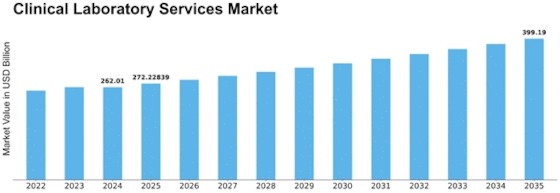


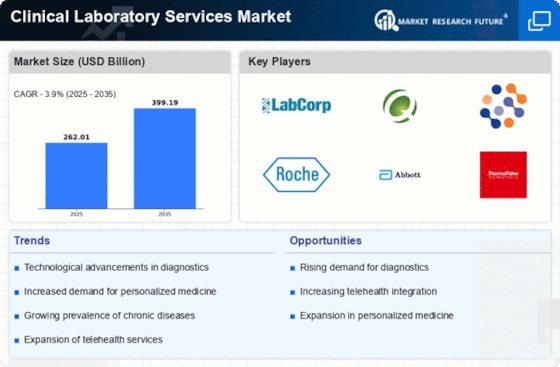

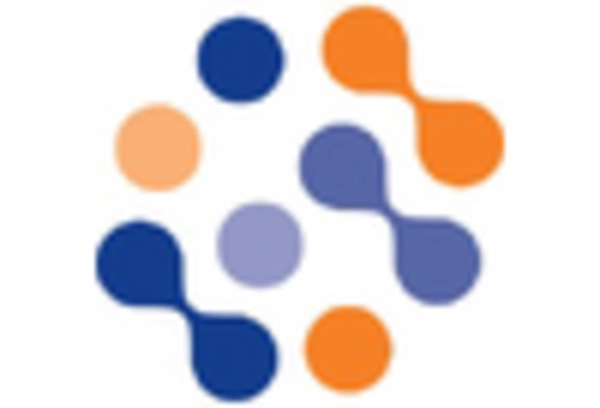
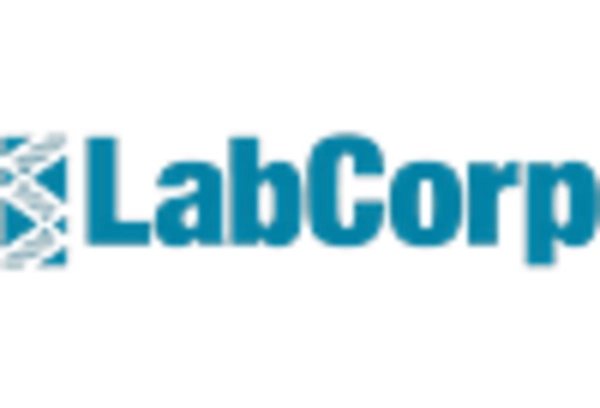
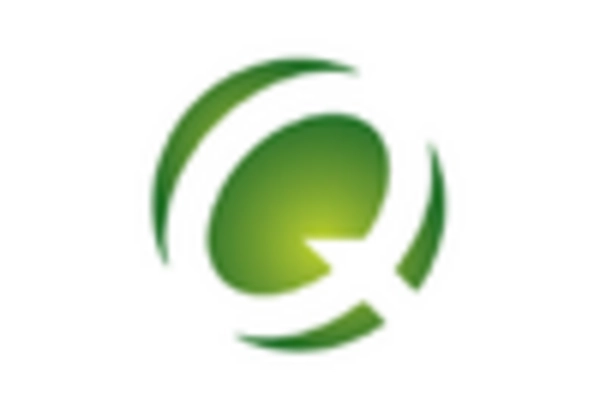












Leave a Comment